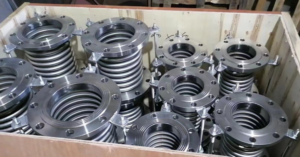Inconel alloys, as superior nickel-based high-temperature alloys, are widely used in numerous industrial fields due to their exceptional high-temperature resistance and corrosion resistance. However, under extreme high-temperature and high-pressure environments, Inconel alloys may face the risk of corrosion failure caused by intergranular corrosion. Therefore, it is necessary to adopt appropriate countermeasures to prevent the occurrence of corrosion failure. This article provides an analysis of corrosion failure countermeasures for Inconel alloys.

Analysis of Corrosion Failure Countermeasures for Inconel Alloys:
Firstly, in terms of material composition, Inconel alloys inherently contain significant amounts of nickel and chromium, which significantly improve the alloy’s resistance to microstructural changes, enabling it to maintain high stability in acidic and alkaline corrosive media. Furthermore, the addition of a certain proportion of molybdenum can enhance the alloy’s oxidation resistance, reduction resistance, and acid resistance. Small amounts of niobium and tantalum can also bolster the alloy’s alkali resistance.
Secondly, the processing technology plays a crucial role in enhancing the corrosion resistance of Inconel alloys. Adopting advanced smelting, casting, and forging processes during production can effectively reduce impurities and defects in the alloy, resulting in denser and more uniform structural organization. This, in turn, enhances the alloy’s corrosion resistance and mitigates the risk of corrosion failure during usage.
Furthermore, surface treatment techniques are among the most commonly used and effective methods to improve the corrosion resistance of Inconel alloys. Techniques such as spraying, electroplating, and chemical plating can form a protective layer on the alloy’s surface, significantly enhancing its corrosion resistance, particularly in extreme high-temperature corrosive environments. For instance, sprayed Inconel alloys exhibit remarkable improvements in corrosion resistance and durability.
Additionally, heat treatment processes are vital in reducing the formation of grain boundary phases in Inconel alloys, thereby lowering the occurrence of intergranular corrosion. By employing appropriate heat treatment processes, such as solution treatment and aging treatment, during the manufacturing of Inconel alloys, we can promote the growth of recrystallized grains and the dissolution of carbides. This optimizes the alloy’s structural organization and mechanical properties, further enhancing its corrosion resistance and service life.
Conclusion
In conclusion, while Inconel alloys possess exceptional corrosion resistance, they are still susceptible to corrosion failure risks in practical applications. Therefore, by addressing aspects such as material composition, processing technology, surface treatment techniques, and heat treatment processes, we can effectively elevate the corrosion resistance of Inconel alloys and reduce the occurrence of corrosion failure under extreme environmental conditions.
Why Choose Huaxiao Alloy?
Thank you for reading our article and we hope it can help you to have a better understanding of the corrosion failure countermeasures for Inconel alloys. If you are looking for suppliers and manufacturers of Inconel alloys, we would advise you to visit Huaxiao Alloy.
As a leading supplier of Inconel alloy from Shanghai, Huaxiao Alloy offers customers high-quality Inconel 600, Inconel 601, Inconel 625, and Inconel 718 at competitive prices.



